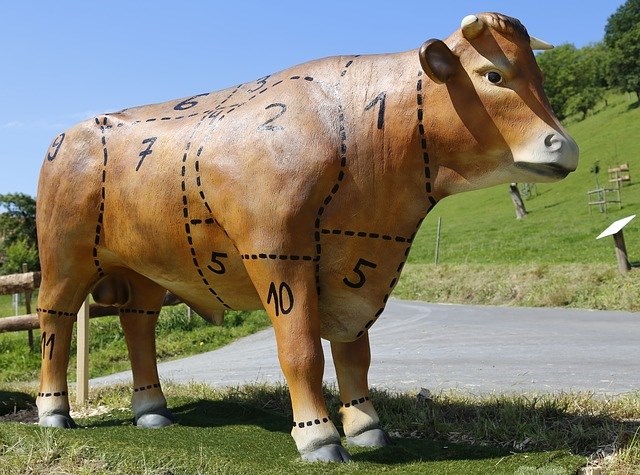This meant a vital opportunity for a serious debate about animal agriculture and its impact on all South Africans was lost in the controversy. The debate about killing animals for food often gets bogged down in discourses relating to the “rights” of animals and the “ethics” of humans. But what is abundantly clear is that animal agriculture is having a devastating effect on the environment and on human health.
Despite growing evidence, research shows that people are less willing to change their diet than make other changes to mitigate climate change. We would argue, however, that in common with many current South African debates around power and privilege, turning away from a meat-based diet has great emancipatory potential.
Meat consumption is soaring
An overwhelming amount of evidence indicates that animal agriculture contributes at least 15% of annual global greenhouse gas emissions. It also contributes significantly to deforestation, leads to biodiversity loss, degrades arable land, consumes vast quantities of water and pollutes water sources.
The industrial production of plant crops is not without its problems, as the multiple concerns associated with palm oil production demonstrate. But these are strikingly less significant than those of animal agriculture when it comes to the environment and climate change in particular.
Despite the urgency of the climate crisis, meat consumption is soaring. In 2003 South Africans spent R46 billion on meat, by 2013 they spent R165 billion. In 2000, South Africans ate 41kg of meat each on average per year. By 2014 this figure had risen to 65kg. This rapid growth in per capita meat consumption is matched – and even exceeded – in other countries of the global south. In China, meat consumption has increased 25% since 2003. The average Chinese consumer now eats 60kg of meat a year.
Meat consumption has stabilised in many countries of the global north, but average levels still dwarf those of the south. For example, Americans eat 127kg per year while Germans eat 89kg.
The global rate of meat consumption is accelerating. The United Nations Food and Agriculture Organisation estimates that global demand for meat will increase by 20% by 2050. The UN’s Environment Programme has responded by calling for “substantial worldwide diet change, away from animal products”.
One of the ways to avoid global temperate rises of less than 4°c is to reduce our consumption of meat. This “our” is an inclusive one, encompassing South Africans and all other global citizens.
This is not to imply that all meat eaters in South Africa eat meat excessively. Economic factors determine if meat is affordable, what type of meat is affordable (organic or processed for example) and therefore what attendant burdens of disease are likely to result from its consumption. Some people are compelled to eat various forms of meat, such as fish, as part of subsistence diets, and meat eaters who cannot afford to buy meat are experiencing significant price increases in plant food sources because of animal agriculture.
The known impact of climate change on food security, rising food inflation, and growing undernourishment and malnourishment in South Africa mean it’s time to urgently find fruitful ways to talk about eating less meat. This won’t be easy.
Why people eat meat
A burgeoning field of literature in recent years demonstrates how simply calling on people in a mechanistic, technocratic fashion to eat less meat is not very useful. The consumption of meat, after all, is embedded within numerous social practices.
This research shows there are four typical rationalisations, known as the 4Ns, for eating meat.
Natural: Some evolutionary biologists claim humans are “hard-wired” by a “meat hunger”; a craving for meat to satisfy basic physiological needs for densely packed proteins and energy. This argument fails to explain, however, the existence of hundreds of millions of vegetarians and vegans who do not eat meat. Their existence suggests that social factors can overcome “meat hunger”, if it indeed exists.
Normal: In an evolutionary sense, eating has played a number of important social roles relating to survival, sharing, bonding, identity, and power. These roles remain deeply embedded in social spheres, and in many contexts eating meat has become the normative manifestation of consumption against which other forms of eating are judged.
Necessary: Despite both anecdotal and scientific evidence that a human can live a full, healthy life abstaining from meat, many rationalise their continued meat-eating by claiming they need to do so to remain healthy.
Nice: There is a simple hedonistic reason for meat-eating: people like doing so.
Researchers argue that these rationalisations are strategies of “moral disengagement”. These strategies obscure personal responsibility, disregard the consequences of actions and construct fictitious counter-narratives that ignore established facts. “Moral disengagement” takes place in other spheres relating to the environment, such as driving an SUV despite the harm it does.
A revolutionary approach
It is hard to get people to eat less meat. But could it also be revolutionary? Feminist scholar and activist Angela Davis, who is a vegan, thinks so. She has described how giving up meat engenders a “revolutionary perspective” because it explicitly links the oppression of humans with the oppression of animals in a capitalist system which commodifies both.
Eco-feminist Carol Adams has convincingly shown how the treatment of animals mirrors the treatment of women in many contemporary patriarchal discourses and practices of consumption. Critical race feminist, Breeze Harper has championed the need to “decolonise” what we eat by moving away from meat eating because of its traditional links to institutionalised forms of racism, classism, sexism, and speciesism.
So talking about the significance of eating less meat, or even giving up meat entirely, needs to be about more than discussions of “rights” and ethics, as it is about intersections of oppression. It is a vital discussion directly linked to humans’ commitments to the environment, social justice, food justice, and wider freedoms for all species.

This article was originally published on The Conversation. Read the original article.
































